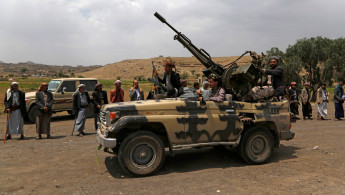Yemen's Houthis claim strike on Saudi oil facility
A coronavirus ceasefire for Yemen has broken apart.
2 min read
Yemen's Houthi rebels claimed to have hit a Saudi oil facility [Getty]
Yemen's Houthi rebels said that Saudi military and civilian facilities were hit in Sunday night drone and missile strikes, a spokesperson for the rebels claimed Monday.
The rebel group claimed to have to have have targeted military facilities and airports in the south of the kingdom, naming Khamis Mushait, Abha, Najran, while saying there was also a successful strike on an oil facility in Jizan.
"With many drones our armed forces targeted military aircraft, pilot accommodation and Patriot systems in Khamis Mushait, and other military targets at Abha, Jizan and Najran airports," Yahya Sarea, the Houthi military spokesman said, according to Reuters.
"Additionally, the giant oil facility in the Jizan industrial zone. The strike was accurate."
There has been no confirmation from Riyadh about any successful strikes by the Houthis, but a 400,000-barrel-per-day Saudi Aramco refinery operates in Jizan.
Earlier Monday, the Saudi-led coalition said that its forces downed drones and missiles fired from Yemen towards Saudi Arabia.
The coalition said in a statement published by Saudi state news that four missiles and six armed drones were launched by the rebels from the Yemeni capital Sanaa towards the kingdom.
It was the latest attempted cross border attack since a ceasefire ended in May.
The ceasefire was implemented in April in a bid to tackle an outbreak of the coronavirus, but the truce fell apart by the end of May.
In late June, Houthi missiles were fired at the Saudi capital Riyadh, while there is had been a huge surge in fighting in Yemen since the ceasefire ended.
The coronavirus has since swept through Yemen, according to media reports, where much of the population is already reliant on aid.
The UN launched virtual talks in a bid to end the fighting, which could worsen the coronavirus outbreak in Yemen.
Yemen, one of the world's poorest nations, has recorded 464 deaths and 1,380 infections.
More than 120,000 people have died in the Yemen war, which began when Houthi rebels stormed the capital Sanaa and moved south.
It intensified after the Saudi-led coalition intervened in March 2015 against the Houthis with waves of airstrikes killing thousands and a blockade devastating the country.
The rebel group claimed to have to have have targeted military facilities and airports in the south of the kingdom, naming Khamis Mushait, Abha, Najran, while saying there was also a successful strike on an oil facility in Jizan.
"With many drones our armed forces targeted military aircraft, pilot accommodation and Patriot systems in Khamis Mushait, and other military targets at Abha, Jizan and Najran airports," Yahya Sarea, the Houthi military spokesman said, according to Reuters.
"Additionally, the giant oil facility in the Jizan industrial zone. The strike was accurate."
There has been no confirmation from Riyadh about any successful strikes by the Houthis, but a 400,000-barrel-per-day Saudi Aramco refinery operates in Jizan.
|
|
The coalition said in a statement published by Saudi state news that four missiles and six armed drones were launched by the rebels from the Yemeni capital Sanaa towards the kingdom.
It was the latest attempted cross border attack since a ceasefire ended in May.
The ceasefire was implemented in April in a bid to tackle an outbreak of the coronavirus, but the truce fell apart by the end of May.
In late June, Houthi missiles were fired at the Saudi capital Riyadh, while there is had been a huge surge in fighting in Yemen since the ceasefire ended.
The coronavirus has since swept through Yemen, according to media reports, where much of the population is already reliant on aid.
The UN launched virtual talks in a bid to end the fighting, which could worsen the coronavirus outbreak in Yemen.
Yemen, one of the world's poorest nations, has recorded 464 deaths and 1,380 infections.
More than 120,000 people have died in the Yemen war, which began when Houthi rebels stormed the capital Sanaa and moved south.
It intensified after the Saudi-led coalition intervened in March 2015 against the Houthis with waves of airstrikes killing thousands and a blockade devastating the country.





 Follow the Middle East's top stories in English at The New Arab on Google News
Follow the Middle East's top stories in English at The New Arab on Google News
![Israeli forces ordered bombed Gaza's Jabalia, ordering residents to leave [Getty]](/sites/default/files/styles/image_330x185/public/2176418030.jpeg?h=a5f2f23a&itok=_YGZaP1z)

